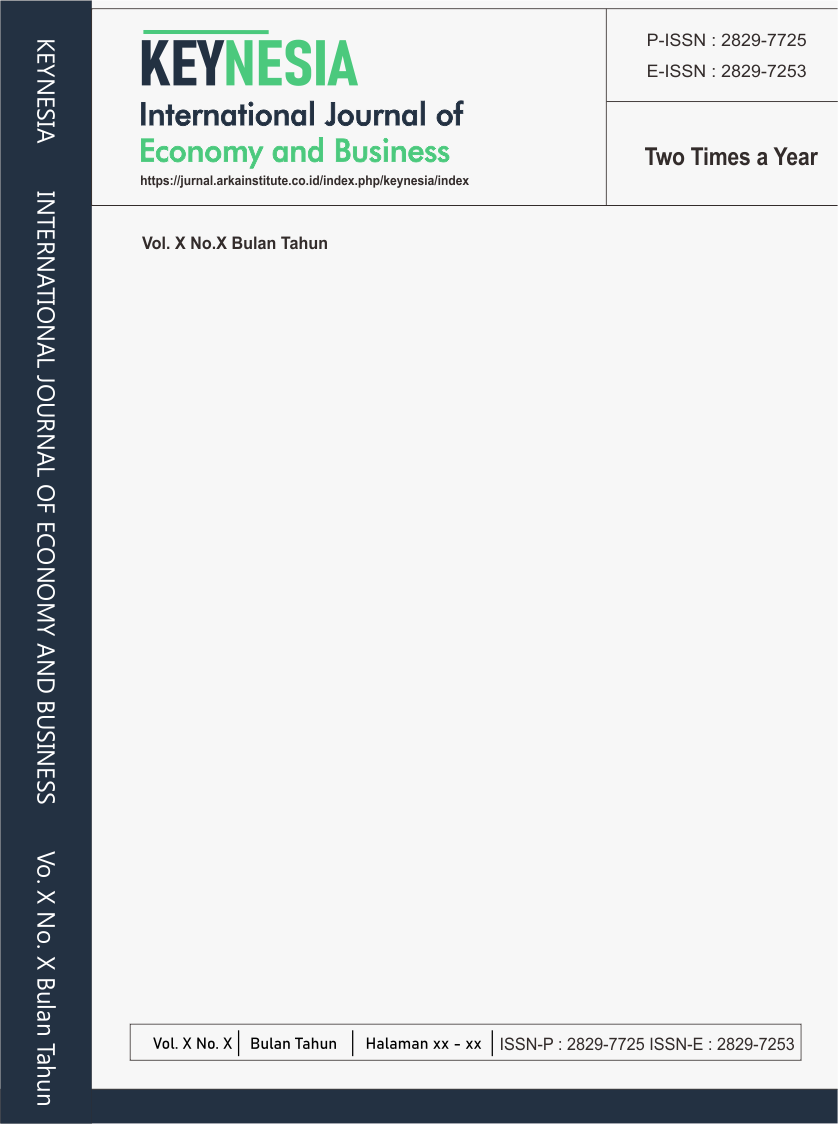The effectiveness and efficiency of financial realization as the basis for budget projection for 2026–2030 at the regional civil service agency of East Kalimantan province
Main Article Content
Abstract
This study examines the effectiveness and efficiency of the budget realization of the Regional Personnel Agency of East Kalimantan Province for the 2020–2024 period, and prepares budget projections for 2026–2030 as a basis for medium-term financial planning. The purpose of this study is to evaluate budget performance and provide recommendations for improvement. The method used is a quantitative descriptive approach with effectiveness and efficiency ratio analysis. Effectiveness is measured by comparing budget realization and targets, while efficiency is calculated from the comparison of budget outputs and inputs. The results show that budget effectiveness tends to be in the effective category, although there are fluctuations that cause some years to be in the moderately effective category. Meanwhile, budget efficiency shows stability in the efficient to very efficient categories. Budget projections for 2026–2030 are prepared by considering historical budget growth and fiscal efficiency policies. These findings are expected to strengthen performance-based budget governance and become the basis for accountable and results-oriented decision-making in local governments. Recommendations include improving budget planning, implementing a periodic monitoring and evaluation system, conducting human resource training, and focusing on program results and impacts to improve the effectiveness and efficiency of the Regional Personnel Agency's budget management.
Article Details
Section

This work is licensed under a Creative Commons Attribution-NonCommercial 4.0 International License.
References
Astika, D., & Alim, M. S. (2025). Budget Efficiency In The 2025 Regional Budget (Apbd) Planning Of West Java Province (A Policy Response To Presidential Instruction No. 1 Of 2025). Irpia: Jurnal Ilmiah Riset Dan Pengembangan, 10(2), 43–58. https://doi.org/10.71040/irpia.v10i2.286
Azhar, A., Abutabenjeh, S., & Nukpezah, J. (2025). Budgeting system and economic development outcomes. Public Administration Quarterly, 49(2), 106–124. https://doi.org/10.1177/07349149241258921
Carr, M., & Beck, M. (2023). Core and periphery dynamics of budget evaluation during crisis: the evolution of an impromptu solution. Journal of Management Control, 34(4), 411–434.
Grossi, G., Reichard, C., & Ruggiero, P. (2016). Appropriateness and use of performance information in the budgeting process: Some experiences from German and Italian municipalities. Public Performance & Management Review, 39(3), 581–606. https://doi.org/10.1080/15309576.2015.1137770
Hadiyantina, S. (2021). The most appropriate strategy to enhance civil servants’ neutrality in the governance. Journal of Economic and Administrative Sciences, 37(1), 61–78. https://doi.org/10.1108/JEAS-03-2019-0031
Halim, A., & Kusufi, M. S. (2014). Teori, Konsep, Dan Aplikasi: Akuntansi Sektor Publik (2nd ed.). Salemba Empat.
Ho, A. T. (2018). From performance budgeting to performance budget management: theory and practice. Public Administration Review, 78(5), 748–758. https://doi.org/10.1111/puar.12915
Marliani, L., & Assyahri, W. (2024). Dampak Sistem Keuangan Desa (Siskuesdes) Terhadap Transformasi Digital dalam meningkatkan Pelayanan Publik Pengelolaan Keuangan Desa. Jurnal Ilmu Sosial Dan Humaniora, 2(2), 233–243.
Naeem, M., Ozuem, W., Howell, K., & Ranfagni, S. (2023). A step-by-step process of thematic analysis to develop a conceptual model in qualitative research. International Journal of Qualitative Methods, 22, 16094069231205788. https://doi.org/10.1177/16094069231205789
Nurfadila, N. (2024). Enhancing public financial management through performance evaluation and cost systems. Advances in Management & Financial Reporting, 2(1), 24–35. https://doi.org/10.60079/amfr.v2i1.264
Ogbu, S. U., Shumba, K., & Abimbola, A. B. (2023). Breaking the silos: role of intergovernmental and interagency collaboration in combating insecurity in South Africa and Nigeria. In Public Sector Marketing Communications, Volume II: Traditional and Digital Perspectives (pp. 67–101). Springer.
Oulasvirta, L., & Rönkkö, J. (2023). Public financial management: Budgeting, accountability and auditing. In Finnish Public Administration: Nordic Public Space and Agency (pp. 111–126). Springer.
Pattawe, A., Abdullah, M. I., Karim, F., Kahar, A., Din, M., Zahra, F., Furqan, A. C., Tanra, A. A. M., & Dharma, D. M. A. (2022). Improving regional financial management through administration of regional property and financial reporting on regional assets. Research Horizon, 2(1), 283–294. https://doi.org/10.54518/rh.2.1.2022.283-294
Prasetyo, W. H., & Nugrahen, A. P. (2020). Analisis Realisasi Anggaran Belanja Dalam Rangka Mengukur Efektivitas Dan Efisiensi Penyerapan Anggaran Belanja Dinas Kependudukan Dan Pencatatan Sipil (DISDUKCAPIL) Kota Magelang Periode 2015–2019. JIMAT (Jurnal Ilmiah Mahasiswa Akuntansi) Undiksha, 11(1), 1–10. https://doi.org/10.23887/jimat.v11i1.24639
Pratama, A., Sam, I. S. I., & Erwati, M. E. M. (2024). Analysis of Financial Performance Measurement at the Jambi City Government Manpower, Cooperatives and SMEs Office Based on the Value For Money Concept. Jurnal Cakrawala Akuntansi, 14(1), 44–54.
Sofyani, H., Riyadh, H. A., & Fahlevi, H. (2020). Improving service quality, accountability and transparency of local government: The intervening role of information technology governance. Cogent Business & Management, 7(1), 1735690. https://doi.org/10.1080/23311975.2020.1735690
Thapaliya, S. (2024). Accounting practices and financial performance of Nepalese small and medium-sized manufacturing enterprises. Shanker Dev Campus.
Ullah, H., Diao, X., & Abbas, H. (2024). Innovation as a mechanism for sustainable economic growth: exploring the role of policy stability and institutional quality in case of China. Environment, Development and Sustainability, 1–33.
Vettriselvan, R., Rajesh, D., Swadhi, R., Velmurugan, P. R., & Arunkumar, S. (2025). Enhancing Efficiency and Accountability: Innovative Approaches to Public Financial Management in Higher Education. In Challenges of Public Administration Management for Higher Education (pp. 81–112). IGI Global. https://doi.org/10.4018/979-8-3693-4346-3.ch005
Zeidan, R., & Shapir, O. M. (2017). Cash conversion cycle and value-enhancing operations: Theory and evidence for a free lunch. Journal of Corporate Finance, 45, 203–219. https://doi.org/10.1016/j.jcorpfin.2017.04.014
Zhuang, L., Zhang, Z., Wang, M., Liu, K., Liu, C., & Wu, W. (2024). Investigating the role of refining urban flood direct loss in enhancing the accuracy of indirect economic loss assessment. International Journal of Disaster Risk Reduction, 102, 104285. https://doi.org/10.1016/j.ijdrr.2024.104285

